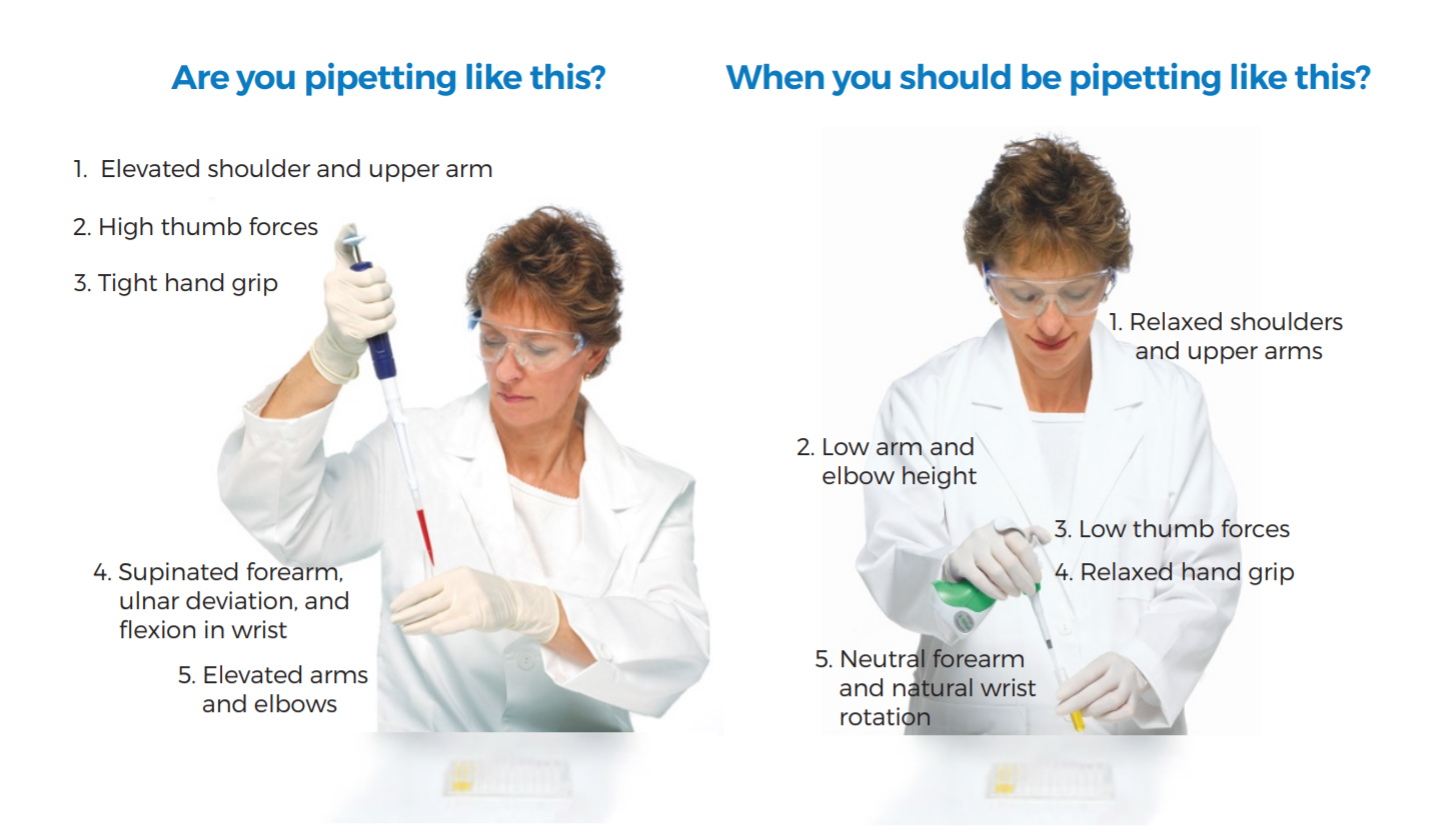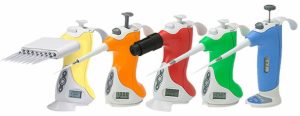Article by Angelo dePalma originally published on Biocompare
Ergonomic pipettes help scientists avoid RSIs.

Repetitive stress injury (RSI) is a common occurrence in laboratories, and is closely related to the ergonomics of operating instrumentation and equipment, and conducting simple but repetitive laboratory processes. Types and extents of injury vary, for example neck or back pain from sitting or bending a certain way for long periods.
The key to avoiding RSI is to assume natural, strainfree posture while conducting experiments, for example using anti-fatigue floor mats and sitting supported by your chair’s backrest.
Under the right circumstances almost any lab activity is capable of inducing RSI. According to an article on common disorders reported by laboratory workers by certified ergonomist Kevin Costello, musculo-skeletal movements involving repetition, contact stress, force, and awkward posture are the most risky. In other words, the entire range of motions involved in pipetting.
Injuries resulting from pipetting are among the most common laboratory RSIs. You’ve probably heard of carpal tunnel syndrome, a disorder affecting the wrists that is also common among typists. Carpal tunnel causes pain, numbness, and tingling in the hands and fingers that limits your ability to grip everyday objects.
Unfortunately carpal tunnel is just one of several RSIs caused by strained or damaged muscles, nerves, tendons, ligaments, joints, and cartilage as a result of many repeated actions sustained over a long period of time. The risk of incurring such injuries varies greatly among lab workers but is related to the degree of repetition and force demanded of specific operations.
The societal costs of carpal tunnel syndrome have been estimated at $30,000 per case. This figure does not include indirect costs in productivity, the potential for experimental error, and quality of life issues that extend to everyday activities. Because the pain and debilitation of RSIs are cumulative, these injuries almost always carry over into lab workers’ personal lives in such simple tasks as unscrewing a bottle cap or opening a car door.
Don’t have time to read the full article? Save it for later!
UCLA Ergonomics provides the following tips for safe pipetting, some of which apply to non-pipetting operations:
• Make sure your seat is the right height and equipment is placed to avoid reaching
• Avoid twisting or rotating your wrists

Reduce hand and grip stress:
• Adjustable hook to “hang” on your hand
• Body shape contoured to be held comfortably
Reduce wrist pain:
Angled non-vertical pipette orientation allows
• Lower arm position
• Natural wrist rotation
Reduce thumb force and stress:
• Low force plunger action• Easy “click” tips on and spring-loaded “flick” tips off
Alternate or use both hands when pipetting:
• Use only enough pressure to acquire and eject tips, or to dispense liquids
• Relax your grip
• Select a pipette with the right size and weight for you
• Take regular breaks
To these suggestions, the Occupational Safety and Health Administration (OSHA) advises pipette operators to use low-profile tubes and containers for reagents, samples, and waste, and to look for pipettes with finger aspiration and thumb dispense. Users should maintain “neutral” wrist and arm postures, “as if they were shaking hands with someone.”
Ovation® pipettes

No pipette can make up for poor posture, or remind you to break periodically from pipetting to rest your hands.
For those ergonomic factors related strictly to the pipette, however, we believe that the Ovation line of ergonomic manual and electronic pipettes offers many advantages.
Ergonomic studies have established that simply decreasing dispense pressures or changing the grip does not automatically confer an advantage in avoiding RSI, but rather may shift the injury potential to a different location. Mitigation of RSI risk therefore required designing manual pipettes from the ground up, which is what VistaLab™ has achieved with Ovation.
Conventional pipettes are axial devices whose lengths strain hands and wrists and force users into uncomfortable positions. A study by Dr. Ming-Lun Lu, an ergonomist at OSHA, outlined the advantages of using a non-axial pipette like the Ovation:

“The non-axial pipette was associated with approximately 2–6 times less thumb and hand force than the traditional axial pipettes. In addition, there were approximately 20–30% reductions in ulnar deviation and 30–70% reductions in humeral elevation to operate the non-axial pipette for most of the pipetting actions.”
Ergonomics also dictates that changes to pipetting postures are essential, for example minimizing forearm and wrist rotations, keeping a low arm and elbow height, and relaxing the shoulders and upper arms.
This is virtually impossible when using elongated axial pipettes which, despite numerous studies suggesting ergonomic deficiencies, continue to dominate the design of allegedly new pipette models.
Ovation pipettes were designed with OSHA recommendations in mind. In fact when VistaLab introduces the Ovation to new users and demonstrates how to hold, reach for, and pick up the pipette, it’s suggested to do so as if shaking hands.
Productivity and reproducibility
Academic and industrial lab managers are increasingly aware of RSIs, which is good for workers, but from a principal investigator’s perspective the main benefits of ergonomics may turn out to be improved productivity.
Numerous articles have been published on the irreproducibility of scientific work resulting from non-authenticated cell lines and reagents. Similarly, human error can be a significant cause of failed experiments or improperly reported results.
RSIs cause operator fatigue, pain, and a general avoidance of good pipetting techniques that are the basis for reliable, reproducible results. Pipette operators experiencing pain take shortcuts that adversely affect technique, avoid or postpone experiments where a significant amount of pipetting normally occurs, or reduce the number of replicates as a means of avoiding discomfort. As a result experiments are delayed or worse, performed in a less-than-optimal fashion that ultimately requires rework.
Since pipetting has become an essential component of so many workflows in the life sciences, lab managers need to pay close attention to the ergonomics of pipetting. That doing so will positively affect scientists’ and technicians’ health is beyond question. As a bonus, labs will experience greater productivity.
For more related articles see Ergonomics or Ovation related posts
